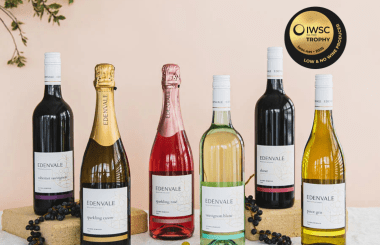Alex Hunt MW: Judging wine well is a curious and fascinating challenge
The IWSC judges are the industry's most influential voices, shaping global markets and driving brand success. From Master Distillers to Senior Buyers, from Head Sommeliers to Bar Directors, these leaders guide the world's top drinks establishments. Through our Insider series, discover why their judgement is so trusted and gain exclusive insights from the experts themselves.
As Purchasing Director at Berkmann Wine Cellars and member of IWSC's Wine Judging Committee, Alex Hunt MW explores the complex skill set required for excellence in wine evaluation.
The Fundamental Challenge
"Judging wine well is a curious and fascinating challenge. At its heart, it involves merging the subjective world of immediate sensation with objective standards of quality – a task that demands concentration, experience and humility."
Beyond Personal Preference
"To anyone protesting at this point that wine tasting is completely subjective, let me say: it really isn't. Judging a wine competition is one of the best demonstrations of this, because we are obliged to drive a wedge between what we like and what we consider to be good. It would be perfectly reasonable for a judge to say "I don't particularly like this wine, but I think it's good for reasons A, B, C." Yet this only makes sense if there is an objective component to the judgment – an agreed "standard of taste", in the phrase of the philosopher David Hume."
The Power of Panel Judging
"This is not to say that judges automatically agree. Perceptions vary; no judge can "see" every aspect of a wine in a single moment. A panel judging a wine is like a group of art critics standing immobile around a sculpture, each viewing the same object from a different perspective. Through sharing their perceptions and debating their verdicts, a more three-dimensional view of the wine can be compiled. The wine judge therefore needs to be both articulate and acutely self-aware: to bring their experience to the table but leave their prejudices at the door."
The Art of Self-Calibration
"They also need to be capable of constant self-calibration – in other words, to recognise how various factors might influence their judgment, and adjust their conclusions accordingly. Mood, fatigue, wine temperature, tannin build-up and the character of the previous wine are just some of the outside influences that can skew judgment one way or another, and need to be taken into account by the conscientious judge."
Confidence and Fairness
"That clarity of perception will engender confidence, and confidence in turn puts the full range of scores at the judge's disposal. Unconfident judges will tend to hedge their bets and overpopulate the Bronze tier even if higher awards – or none at all – are merited. Similarly, an over-compassionate judge might tend too strongly towards Silver, devaluing the category through kindness. Clear thinking and a healthy balance between enthusiasm and scepticism will tend to produce the fairest results."
The Ultimate Goal: Justice
"After all, the outcome of any judgment should be justice. Merits should be rewarded and defects penalised, to a degree that is consistent across the competition and relevant within the wider context of wine. For this, a great judge also needs a great memory, able to compare their perceptions of a given wine to past references of quality, both within the style being judged, and beyond. This way, what might just look like an isolated judgment on the day becomes imbued with greater meaning and purpose.
A great wine judge therefore needs to synthesise many contrasting attributes, combining powers of perception with verbal and logical prowess, strength in advocacy with humility in discussion, self-awareness with objectivity, concentration in the moment with agility of recall, open-mindedness with conviction – a skill set as complex and intense as the great wines we are always waiting to praise."
Alex Hunt MW is Purchasing Director at Berkmann Wine Cellars and member of the IWSC Wine Judging Committee. His journey from Oxford University's Varsity Blind Tasting Team captain to respected industry voice includes writing for world's leading wine publications, bringing both philosophical insight and commercial expertise to wine evaluation.
More views and insights in the IWSC Insider series.



